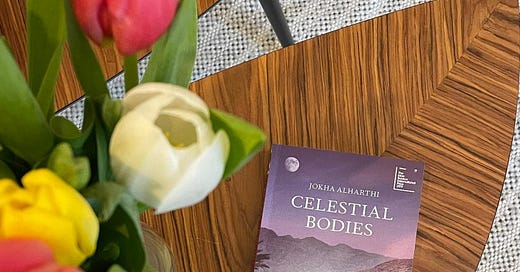Welcome to Bookmarked, a weekly newsletter following my journey as I read one book from every country. If you’re enjoying my project, I’d love it if you shared Bookmarked with a friend.
Omani author Jokha Alharthi’s Celestial Bodies, the winner of the 2019 International Man Booker Prize, is a multi-generational saga that shines a light on several unhappy marriages. Largely set in the village of al-Awafi, the novel loosely rotates through the perspectives of multiple interlinked characters—though Abdallah is the only one afforded a first person narrative, with everyone else voiced in the third person.
Though Celestial Bodies tells many people’s stories, it centres around sisters Mayya, Asma, and Khawla. The novel opens with Mayya, the oldest sister, dreaming of a man named Ali who has just returned to Oman from his studies in London. When Mayya’s mother announces that she is not allowed to be with Ali and must in fact marry Abdallah, the son of a wealthy merchant, Mayya does so unwillingly. But, in an act of rebellion, she names her first child London after the man she wanted to marry. Her friends and family are predictably horrified.
Asma’s marriage is also arranged by her parents, who organise for her to marry Khalid, a self-obsessed artist who sees his wife as nothing more than a missing piece in the jigsaw puzzle of his life.
What had attracted him to Asma—as she gazed wide-eyed at his canvases—was that she fit his needs perfectly. He had already decided on marriage to a woman who would somehow stand out from all the others, with some quality of note. He chose accordingly, looking for a woman who would fall instantly into the orbit he had marked out, who would always be there but would always stay just outside, yet without wanting to create her own celestial sphere, her own orbit.
While Asma devotes her life to her fourteen children, Khawla marries her childhood sweetheart Nasir, only for him to spend their entire marriage cheating on his wife with another woman in Canada.
Celestial Bodies moves back and forth through multiple generations, often in the course of a single page, meaning we also meet those who come both before and after the three sisters. We see London grow up, enter into her own abusive marriage, and eventually become a doctor. We also see Abdallah’s childhood and learn that his father not only made his fortune from the slave trade, but also had a love affair with one of his own slaves, Zarifa, who played a key role in raising Abdallah after his mother’s death.
In tracing these characters’ personal narratives, Alharthi tells a powerful story about what happens when societies become urbanised, women start to receive a better education, and children have more opportunities than their parents and grandparents could have imagined. In Celestial Bodies it is, for the most part, the women who seize these opportunities while the men grapple with their childhood traumas, struggling to move on from their pasts.
Formally, Celestial Bodies is quite unlike anything I’ve read before, moving from one character to another, one generation to the next quickly and repeatedly over the course of sixty short, non-linear chapters. And voicing everyone but Abdallah in the third person has an interesting effect, tying the reader to Abdallah and his insecurities as he witnesses the women in his periphery flourishing.
At 243 pages, Celestial Bodies isn’t a long read but the huge number of characters had me referring to the family tree at the start of the book a lot. Though the sheer volume of characters meant that I never felt fully invested in any of their individual stories, this was a nonetheless a stylistically interesting book that had me thinking about the many different ways we tell stories. Definitely a worthwhile read.
Celestial Bodies by Jokha Alharthi, translated by Marilyn Booth (Sandstone Press, 2018 / 2010)
More books by Omani authors
Here’s a short list of other recommendations:
My Grandmother’s Stories by Khadija bint Alawi al-Dhahab, tr. W Scott Chahanovich, Munira Al-Ojaili, Fatima Al-Mashani, Muna Al-Mashani, and Muna Saffrar
Earth Weeps, Saturn Laughs by Abdulaziz Al Farsi, tr. Nancy Roberts
What have you read recently?
If you’ve read a brilliant book in translation or want to pass on a recommendation, I’d love to hear about it! For this project, I’m focussing on contemporary fiction and short stories, with a preference for female authors—but I won’t be too dogmatic about it so do share recommendations that don’t quite fit the bill, too.
You can get in touch by replying to this email or leaving a comment. I’ll be featuring your recommendations in upcoming newsletters, and I’ll keep a growing list here.
Bookmarked is written by Tabatha Leggett. Thank you to Julia Peters from the Emirates Airline Festival of Literature for her recommendations. If you know someone who would enjoy this newsletter, please forward it to them!




